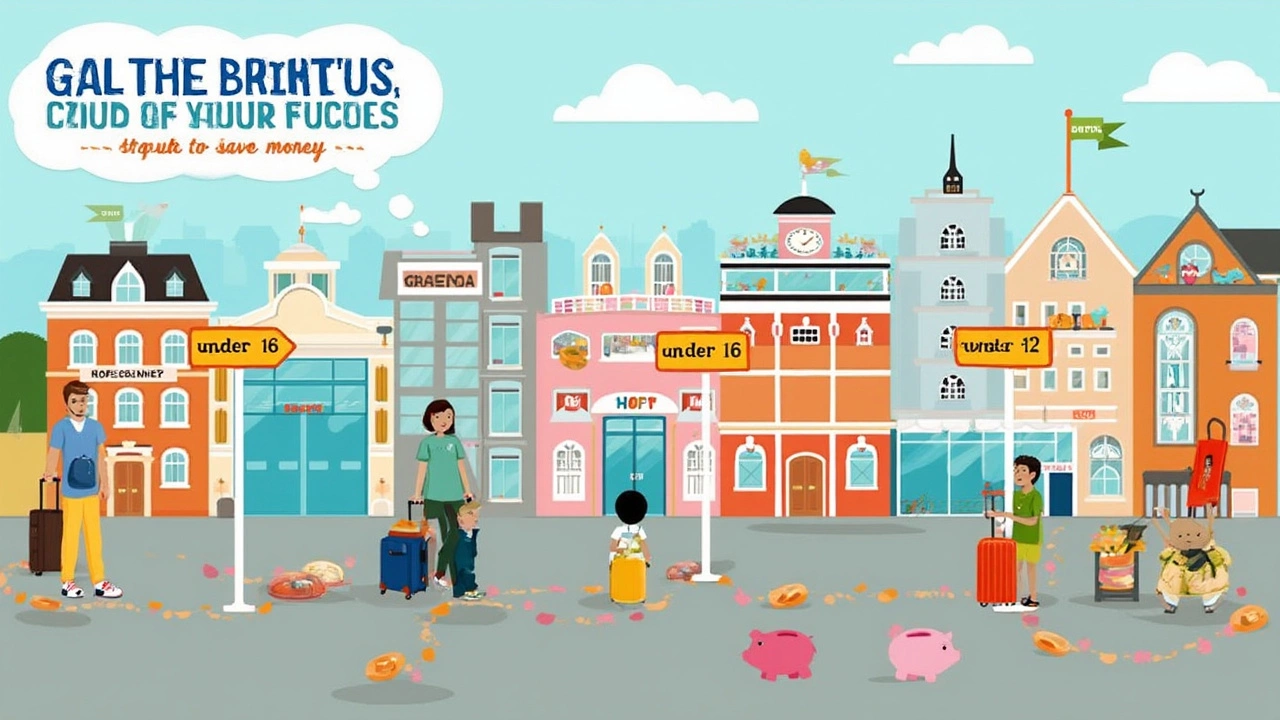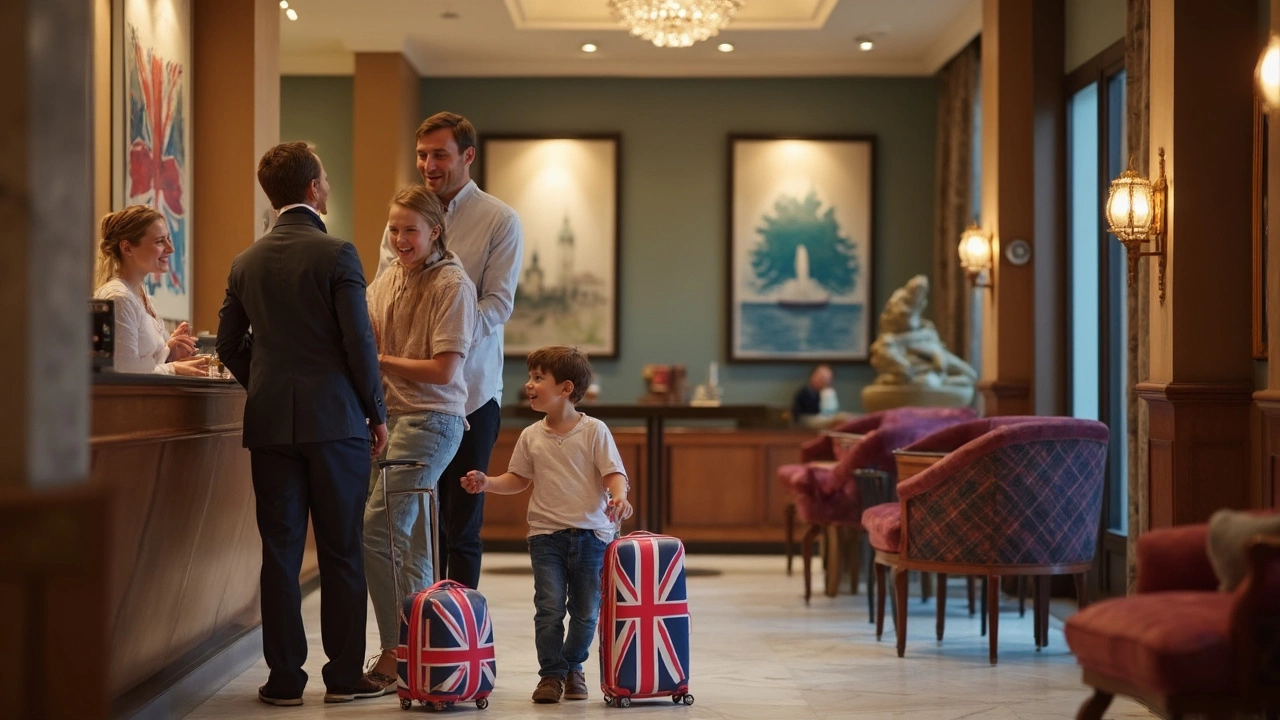What Age Is Considered a Child for Hotels? Booking Rules Explained
3 May, 2025Ever tried booking a hotel with kids and found yourself stuck at the “how old are your children?” box? You’re not alone. Hotels have a wild mix of rules about what counts as a 'child.' It doesn’t always line up with what the airlines or theme parks say, and sometimes it’s designed to save you—or cost you—money.
Here’s where it gets weird: at one hotel, any kid under 12 might stay free with parents. Next door, the limit might be 17. Some places, a 13-year-old is old enough to need their own bed (that you pay extra for). At others, a six-year-old eats breakfast for free, but an eight-year-old pays full price. It’s all about hotel policy, not logic.
Understanding these child age limits can save your family a good chunk of cash or score you deals like free meals or rollaway beds. Before you book, don’t just guess—look for the official age cut-off on the hotel website or in the fine print. That one detail could change what you pay, what freebies you get, and how much everyone enjoys the trip.
- Why Hotels Define a Child’s Age Differently
- Common Age Cut-offs You’ll See
- The Perks (and Pitfalls) of Child Age Rules
- How to Find and Use Family-Friendly Policies
- Tips for Making the Most of Kid Policies When You Book
Why Hotels Define a Child’s Age Differently
So why does one hotel let a 17-year-old count as a kid and another charges for a 12-year-old like they're a full-grown adult? It’s mostly about money and logistics. Hotels set their hotel child age rules to balance room costs, demand from families, and what works best for their business model.
For instance, many large American hotel chains, especially those targeting families, treat anyone under 18 as a child because that matches the legal definition of a minor in the U.S. In Europe, though, the cutoff is often 12 or even 10, since family structures and average room sizes are different. Some Asian hotels let kids up to 16 stay free, hoping to win over big family groups. So, it’s not random—it's about appealing to the market they're in.
What else drives these decisions? Food and safety count too. Free breakfast for kids under 6 makes sense for buffets with lots of families, while business hotels rarely have these perks. On the flip side, insurance and guest safety rules sometimes mean hotels can’t have extra (small) kids packed into a room, so they keep the age lower.
- Family hotel policy: A resort aiming for family vacations will usually have a higher kid age limit.
- Kid stay rules: City hotels may set a lower age for children to avoid overcrowding rooms.
- Local laws: In some places, the law decides how young someone can be to share a room with adults.
Here’s a quick look at some popular chains and their age limits:
| Hotel Brand | Child Age Limit |
|---|---|
| Holiday Inn | 17 and under |
| Hilton | 17 and under |
| Novotel | 15 and under |
| Premier Inn (UK) | 15 and under |
| AccorHotels (Europe) | 11 and under |
There isn’t a one-size-fits-all globally—it’s all about what each hotel thinks will fill rooms and keep families (and their wallets) coming back.
Common Age Cut-offs You’ll See
Hotels don’t follow just one rule when it comes to hotel child age limits. Instead, you’ll see a range of cut-offs, depending on where you’re staying. The most common ages that pop up are 12, 16, and 17. Why so random? It often depends on a hotel’s target guests and even country laws.
Here’s a snapshot of typical child age limits at hotels:
- Under 12 years: This is the sweet spot for a lot of big chains. Kids 11 and under usually stay free with parents and can use existing bedding.
- Up to 17 years: Some U.S.-based brands (like Holiday Inn) consider anyone under 18 a child for sharing rooms and getting free stays or meals. This is great if you have teens.
- Under 6 years: Asian hotel brands and some resorts only let kids under six stay or eat free. For example, in Japan, many business hotels give free breakfast only up to age six.
- Under 2 years: Babies and toddlers usually sleep for free in a crib or cot. Most hotels have a 'no charge' policy for children under two if you don’t need an extra bed.
Here’s a quick comparison to make things easy:
| Hotel Chain/Region | Child Age Limit (Stays Free) | Notes |
|---|---|---|
| Holiday Inn (U.S.) | 17 and under | Free stay and eat for kids at most locations |
| Hilton Hotels | 17 and under | Must share existing bedding; check specific hotel |
| Ibis (Europe/Asia) | 11 and under | Kids under 12 stay free with parents |
| Marriott | Varies (usually 12 or under) | Some locations: 17 and under; Best to check terms |
| Business Hotels (Japan) | 6 and under | Free breakfast up to age 6 |
What's the catch? With almost every family hotel policy, there's a gotcha in the details. Most free stays only apply if your kid uses the existing bed—get an extra rollaway, and you usually pay extra, even if your child is "free." Also, breakfasts and buffets usually have different age cut-offs than room rates, so check twice if you’re counting on free food.
Don’t just look at the room price—dig into the fine print about kids. The hotel age limits in the table could make or break your budget, especially on long trips or with older kids. It's always worth a quick email or call to confirm before you show up at the front desk and get a surprise bill.

The Perks (and Pitfalls) of Child Age Rules
Getting the "hotel child age" policy right can mean a big difference for your trip budget. Hotels often roll out free perks for kids, but there’s always fine print. Usually, you’ll see hotels allow one or two kids under a certain age—often 12, sometimes as high as 17—to stay for free in a room with adults. That can mean hundreds in savings just by knowing the cutoff.
Many chains like Holiday Inn and Marriott will let kids eat or stay free, but only if they fit the official age window. For example, IHG’s “Kids Stay and Eat Free” deal cover kids under 12, but as soon as your kid turns 13, you’re paying—sometimes even adult rates. Then there’s the surprise breakfast fees. Some hotels will feed your six-year-old for free at the buffet, but the minute they’re seven, you’re out another $10 a day.
If your kid is right on the edge of an age bracket, be ready for awkward moments at check-in. Hotels might ask for proof of age—especially in resort destinations or peak season. Lying about junior’s age could backfire fast. On the other hand, don’t forget that family hotel policy can actually work for you. Asking for a crib or rollaway because your four-year-old still needs it? Most family-friendly hotels will provide one for free if you ask when booking.
- Always check if the free child hotel policy includes meals, not just the room.
- Some deals don’t cover extra amenities. Free room but you pay for the kid’s breakfast or pool access.
- Teens often count as adults even though you might not expect it—especially for all-inclusive resorts.
- Hotels in Europe typically set younger age limits (often 7-11), while U.S. brands tend to be more generous—sometimes going up to 17.
| Hotel Brand | Kid Stays Free Up To | Free Meals for Kids |
|---|---|---|
| Holiday Inn | 12 years | Yes, under 12 |
| Hilton | 17 years (with adult) | Sometimes, varies by hotel |
| Marriott | 12 years | Sometimes, varies by location |
| Accor (Europe) | 11 years | Usually not included |
One final tip: Always search the hotel's own website or call if the rules are unclear. Booking through third-party sites can sometimes hide these policies in the fine print, and you want to know exactly how their kid stay rules work before you show up with the whole crew.
How to Find and Use Family-Friendly Policies
Hotels love to talk up their family hotel policy, but digging out the exact rules takes some hunting. Start by checking the hotel’s own website—not every travel booking site lists the same details. Scroll to the section with FAQs or policies and look for keywords like “child age,” “kid stay rules,” or “family policy.”
Many chains—like Marriott, Hilton, and Holiday Inn—spell out these details clearly. For example, Hilton usually considers kids under 18 as children if they’re sharing a room with parents. At Marriott, the cutoff can be 12 or younger, and with Holiday Inn, up to two kids under 18 stay free and eat free at their in-house restaurants, when accompanied by an adult.
If the policy is fuzzy or missing, don’t be shy about emailing or calling the hotel. Front desk agents deal with these questions all the time and can confirm things like free stays for your littlest, free child hotel perks, or any surprise charges for extra beds or breakfasts. A quick call is worth it—nobody likes finding surprise fees at check-in.
Want a clearer picture? Search for reviews using terms like “traveling with kids at [Hotel Name].” Parents often spill the beans on the real rules and what’s flexible.
- Ask if breakfast or meals are free for your kids. This one move can save you a lot, especially in cities where eating out gets pricey.
- Double-check if kids need to be under a certain age for a free child hotel stay. Some hotels offer free cribs; some charge for rollaway beds or sofa beds.
- Look for special perks—some properties have free kids’ clubs, game rooms, or even pool toys to use, all hidden in the fine print.
A quick side-by-side makes things clearer. Here’s how a few big hotel chains handle hotel child age for stays and perks:
| Hotel Chain | Child Age Cutoff | Key Family Perk |
|---|---|---|
| Hilton | 17 and under | Kids stay free in room with parents |
| Marriott | Usually 12 and under | Varying family packages, check location |
| Holiday Inn | 18 and under | Kids stay and eat free with an adult |
Bottom line: reading policies, making one quick call, and hunting down parent reviews online is the best way to use hotel age rules to your advantage. That extra five minutes can mean big savings—sometimes enough to treat the whole family to dessert, or that night swim the kids begged for.

Tips for Making the Most of Kid Policies When You Book
Getting the best deal on a family stay means getting picky about hotel child age rules. Here’s how you can sidestep extra fees and even score some perks, just by knowing the hotel’s child policy inside out.
- Always double-check the age rules: Don’t rely on third-party sites alone. Some hotels let kids under 12, 16, or even 17 stay free in the room. Others set the cut-off at 6 or 8. Look for it in the room description or FAQs.
- Input correct ages when booking online: When booking directly or via big hotel chains, put your actual kid’s ages into the booking system. Some sites automatically adjust your rate if your kid qualifies for free stay or breakfast.
- Call to clarify if in doubt: If the website language is vague (“child under 16 stays free with paying adult”—but meals?), call or email and get it in writing. This helps avoid unexpected charges at check-in.
- Watch for package deals and freebies: Big chains like Marriott, Hilton, and Holiday Inn often bundle free breakfast, meals, or activity passes for kids under certain ages. Local hotels may have less obvious deals—sometimes just for booking direct.
- Check for fees on extra beds: Even if a kid stays free, ask if there’s a charge for a crib, rollaway, or sofa bed. Some hotels include these, others sneak in a $20-40 fee per night.
- Be upfront about family size: Don’t try to squeak past the rules with kids listed as "infants" or not mentioning them. Some hotels do head counts during check-in and will charge for extra guests if your booking didn’t match your family size.
Here’s a quick look at age rules and freebie thresholds at a few well-known chains:
| Brand | Kids Stay Free? | Age Limit | Free Breakfast? |
|---|---|---|---|
| Hilton | Yes | 17 and under | Varies by property |
| Holiday Inn | Yes | 18 and under | Kids under 12 eat free |
| Marriott | Yes | Usually 12-17 (depends on brand) | Depends on brand |
| Accor | Yes | 16 and under | Varies by property |
Pro tip: Hotel loyalty programs sometimes boost the family hotel policy perks for members, so sign up—it’s almost always free. Even if you’re brand new to a chain, you might get welcome gifts for children or bonus points just for including your kids’ info in your booking.

 by
by